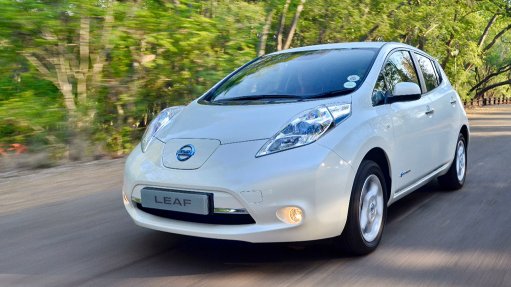
Nissan South Africa (NSA) has, since the introduction of the LEAF electric vehicle (EV) on the local market, in 2013, sold only 80 units.
Compared with the 450 296 cars sold in 2013 and the 439 264 cars sold in 2014, this was an indication that the local market remained reluctant to adopt the new technology.
The two biggest challenges facing the adoption of EVs in the country were the price and “charging anxiety”, NSA corporate affairs and communications director Wonga Mesatywa told journalists at a roundtable at the Nelson Mandela Metropolitan University (NMMU), in Port Elizabeth, this week.
Retailing at just under R500 000, he noted that the price tended to be a sticking point for consumers.
“In other markets, such as Europe, Japan and the US, this question is dealt with together with government,” he said, pointing out that the US pledged over R12.4-billion in grants to encourage consumers to buy EVs, while China budgeted over R150-billion to support the EV market.
Mesatywa added that, although the average South African driver commuted less than 60 km a day, range anxiety – where drivers feared they would not reach their destination – was still a significant challenge.
There were 13 EV charging stations in Gauteng, one in Durban and one in Cape Town. Mesatywa noted that the roll-out of more charging stations was under way, in line with NSA’s partnership with BMW South Africa to jointly plan and build an EV and plug-in hybrid EV charging station national grid for use by Nissan and BMW vehicles.
“In the next 12 months or so we will start filling up the [map]; it will be a very crucial period for us. Our next phase is purely focused on infrastructure and sharing expertise and ideas to grow acceptance of EVs,” he added.
The number of charging stations would increase to 30 in Gauteng, 12 in KwaZulu-Natal, 10 in Port Elizabeth, 15 in Cape Town, 10 in Mpumalanga, 10 in Limpopo and 5 in central South Africa, as well as stations in more remote areas.
NSA also expected to sign developmental agreements with other vehicle manufacturers entering the EV market after its memorandum of understanding with BMW SA expired in 2017.
“We want to broaden the lobby base and fund for EVs, which might come from different perspectives, but the end-goal is the same,” he said.
Also speaking at the roundtable, NMMU Uyilo e-mobility programme EV systems senior engineer Hiten Parmar noted that the university’s partnership with NSA had allowed it to analyse the LEAF and how it needed to interact with the grid network.
He said Uyilo’s facilities comprised a battery testing laboratory, a live-testing environment to see how vehicles interact and component development support for skills development towards the vehicle itself.
“We have educated a lot of people towards the awareness of the vehicle. This technology is available in South Africa; we are here to support industry, eliminate barriers and increase the uptake of the vehicles in the market.”
BATTERY SCIENTISTS
NMMU chemistry Professor Ernst Ferg noted that the battery market for EVs held great potential for job creation in the country, but that it required an increased focus on skills development.
“It is one thing to have EVs in the country, but it is another thing to service them,” he said, adding that there was a need to teach scientists in a field that was still very new and that through this, a market, industry and work environment would be created.